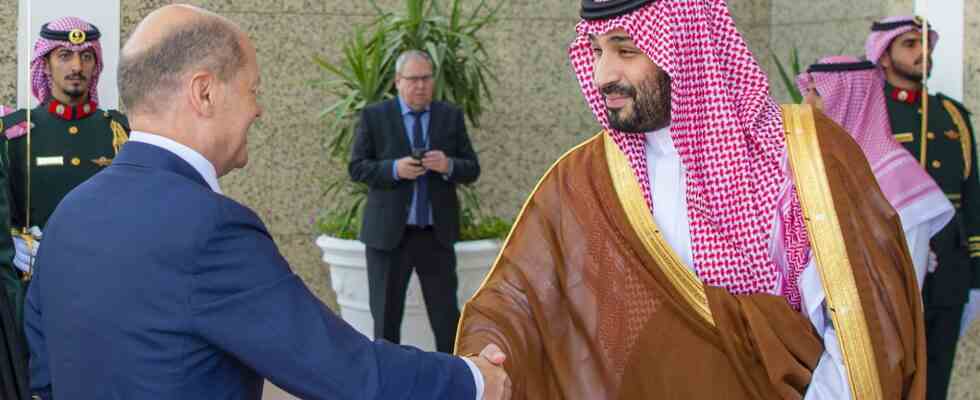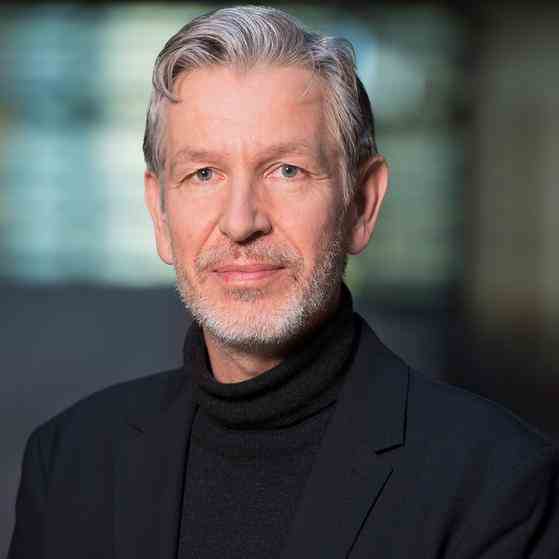analysis
Status: 09/26/2022 04:06 a.m
Three countries in two days: the trip to the Gulf was a difficult mission for Chancellor Scholz. In search of new energy suppliers, he had to turn a blind eye.
A ship will arrive. After all. End of the year. Around 140,000 cubic meters of gas from the United Arab Emirates on board. It is a first, albeit tiny, success of the Chancellor’s whirlwind tour of the Gulf. Three countries, two days, in the end two concrete contracts – in addition to the liquid gas deal, which is to bring LNG to the terminal being built in Brunsbüttel, a delivery of around 250,000 tons of diesel to the Lower Saxony company Hoyer. A success? “A start,” according to government circles, because the chancellor took a look at the big prospects.
Journey through the Gulf region: Scholz visits the United Arab Emirates and Qatar
9/25/2022 6:21 p.m
It is also about the longer-term idea for Germany to operate in a CO2-neutral manner in the future and to advance hydrogen projects. “Regardless of new supply contracts, we also want to further develop the technological advances for climate-neutral business with the Gulf States and at the same time guarantee energy security,” said Scholzsprach in the usual sober manner in Doha, the last station of the 48 hours in the Gulf.
But of course they also know in the Chancellery that more kilowatt hours of gas flowed from the Nord Stream 1 gas pipeline in one day alone than the entire LNG deal with the Emirates now includes.
Scholz keeps his composure
In any case, the chancellor made an honest effort on his golf tour. Occasionally also with exertion of diplomatic composure. In Saudi Arabia, for example, the first stop, he smiled and shook the hand of the man who allegedly staged the horrific murder of journalist Khashoggi. Mohammed bin Salman. Crown Prince and powerful man of the self-confident Saudi state.
The man is 37 years old and he knows that the time has just come for him and his country. Saudi Arabia has rich gas reserves, wants to export not only oil but also gas on a large scale by 2030 and then one – maybe the biggest player for energy on the market.
Macron was the first to lift the crown prince’s western ban. British ex-Prime Minister Johnson followed. Most recently US President Biden. “We’ll line up there,” was the realpolitik answer to the energy policy necessities from the Chancellery.
Light off? Not in Saudi Arabia
Everywhere in Saudi Arabia, the country shows off its energy wealth. At night, light installations on the high-rise buildings sparkle, the air conditioning systems run at full blast to make the night heat bearable. In Saudi Arabia, German debates about switching off building lights at night only get a weary smile.
So the chancellor and his delegation were in the brightly lit palace of the crown prince, listening – sitting under the portrait of King Salman – to the visions of a man who decreed progress and even more energy wealth for his country with an iron fist.
On the one hand, society is opening up to women who have been disadvantaged for a long time. You have recently been allowed to drive a car – but only because the crown prince wants it that way now. The headscarf is no longer compulsory, some only wear it because they want to. This is what some of the 30 artists, entrepreneurs and athletes who later meet the chancellor in Jeddah, Saudi Arabia, say. The women tell him that the country is more progressive, with many opportunities. “In four years we have achieved more for women here than in the last 40 years,” says one entrepreneur ARD-Capital Studio, who then introduced the Chancellor to Saudi Arabia in a direct conversation.
No press conference, no uncomfortable questions
However, they did not mention the country of the executions, the persecution of bloggers. The chancellor said in typical words that he had definitely spoken to the con prince about this. “You can assume that what needs to be said has not gone unanswered,” was Scholz’s tight-lipped reply.
Whether the name Khashoggi actually came up – no one knows. Human rights were the subject of a 20-minute one-to-one discussion. There was no press conference by the heads of government in either Saudi Arabia or the Emirates. Unwelcome questions are thus avoided. The West needs Saudi Arabia, for example when it comes to the wars in Yemen and Syria or the conflict with Iran.
It’s about a “solid working relationship” is the motto of the German government. This solid working relationship, which is probably a summary of the lightning trip to Jeddah, Scholz should have achieved during the first longer direct encounter with “MBS”, as the crown prince is commonly called.
Most of the gas goes to Asia
And the United Arab Emirates? A long-term partner anyway. The two countries have been celebrating mutual relations for exactly 50 years. A round anniversary as an encouraging date for a chancellor to ring the doorbell in search of gas and hydrogen.
However, over 75 percent of the country’s rich gas resources are currently going to Asia. As a gas customer, Europe is at best a bycatch. Reason enough for the Chancellor to emphasize the long-term nature of the future cooperation. LNG as a bridge on the way to a climate-neutral economy that relies on hydrogen from the Emirates.
The Emirates, on the other hand, are already producing solar power for 1.3 cents per kilowatt hour. Almost four times cheaper than Germany. Economics Minister Habeck was enthusiastic during his visit in March and told the story that people like to tell here. Long ago the sheikhs would have said: “The day we produce the last ton of oil, we will celebrate. And until then we have to work.”
And during Scholz’s visit, work was done, deals negotiated and completed. When the chancellor and the Saudi Arabian environment minister planted a tree in a mangrove park near Abu Dhabi as a signal for more climate protection, RWE and Total were already busy bagging contracts in the background, albeit for fossil fuels: liquid gas and diesel.
In the run-up to this, the Emirates have done a lot of work for renewable energies. Build huge solar fields, work on the production of green hydrogen and see themselves well positioned for the market of the future. With Germany as a solvent customer.
The next dependency?
Aren’t we going to have the same energy dependency in the Gulf that got us where we are in Russia? The chancellor says no. “It won’t happen to us a second time,” he says very confidently.
Every engagement in the Gulf is also embedded in the framework in which everyone knows who Germany is and what rights Germany stands for. And so the mood in Qatar was a bit chilly when the Chancellor stood with the Emir in his palace and quietly read off positions: For the minimum wage, good working conditions, human rights and yes, also for the 2022 World Cup, everyone wishes all the best.
The Emir of Qatar was happy about 34,000 tickets, which German fans had apparently already asked for for the World Cup – and possible future energy deals with Germany, for example on the subject of liquid gas.
So there was no real success story to tell in Doha that afternoon. Negotiations on more liquid gas from Qatar are said to be ongoing. The chancellor’s visit might be another step in the right direction.
Scholz’s golf class – summary of the two-day shopping trip
Georg Schwarte, ARD Berlin, September 26, 2022 5:55 a.m


